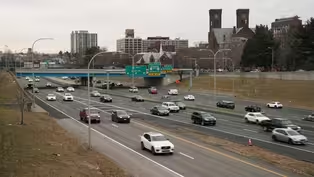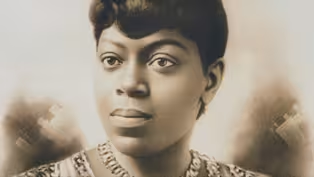
Master & Slave Journey
Clip: Season 4 Episode 10 | 9m 51sVideo has Closed Captions
Slaves William and Ellen Craft’s dangerous journey to freedom in the mid-1800s.
David Wright interviews best-selling author Ilyon Woo about her new book, "Master Slave Husband Wife." Woo tells the story of an enslaved couple, William and Ellen Craft, and their daring escape to freedom back in the mid-1800s.
Problems playing video? | Closed Captioning Feedback
Problems playing video? | Closed Captioning Feedback
Rhode Island PBS Weekly is a local public television program presented by Ocean State Media

Master & Slave Journey
Clip: Season 4 Episode 10 | 9m 51sVideo has Closed Captions
David Wright interviews best-selling author Ilyon Woo about her new book, "Master Slave Husband Wife." Woo tells the story of an enslaved couple, William and Ellen Craft, and their daring escape to freedom back in the mid-1800s.
Problems playing video? | Closed Captioning Feedback
How to Watch Rhode Island PBS Weekly
Rhode Island PBS Weekly is available to stream on pbs.org and the free PBS App, available on iPhone, Apple TV, Android TV, Android smartphones, Amazon Fire TV, Amazon Fire Tablet, Roku, Samsung Smart TV, and Vizio.
Providing Support for PBS.org
Learn Moreabout PBS online sponsorshipa story of an enslaved couple who were household names in the mid 1800s.
Their flight to freedom, front page news.
William and Ellen Craft became stars of the abolitionist lecture circuit here in New England before they ultimately fled the country.
Their story, all but eclipsed by the Civil War that ultimately ended slavery, is now the focus of a new book.
David Wright recently sat down with the author, Ilyon Woo, to hear the couple's remarkable story.
- It took me a long time to get to the story.
Then what ended up happening is I started looking into the history.
And what I found in the archives was so revelatory about the crafts, but also yielding this bigger picture of our nation.
I think one that's very much relevant today that I felt compelled as an American scholar to tell this story.
- [David] Author Ilyon Woo's new book, "Master Slave Husband Wife" tells the story of William and Ellen Craft and their daring flight to freedom.
This is 1848, pre-Civil War, and this couple, a married couple, and slave to different masters sets out from Macon, Georgia.
- It's harrowing because the stakes are so high, right?
Because at any moment if they're caught, if they're captured, they will inevitably be separated, tortured, or killed.
They were not hiding.
They were not going underground.
They were traveling aboveground on actual railroads-- - This is not the Underground Railroad.
This is the overland normal railroad.
And she, Ellen Craft is passing not only as a white person, but as a white gentleman.
- As a white disabled man.
So she's going from being really at the bottom of the social hierarchy as an enslaved woman to the very top.
- [David] Disability was a crucial part of the disguise.
- She had her arm in a sling.
She doesn't have the poultices on her face here, but she's got her glasses, she's got her tie and her white shirt and everything.
- [David] Dressing as a privileged man staved off questions.
Her overall appearance of vulnerability bolstered her cover story of being a slave holder who needed help from his valet to travel.
What was the disability that she pretended to have?
- So it was a combination of different disabilities I think that could be improvised depending on where she was and what she needed.
But the general complaint was rheumatism.
I think this is also a time of a global pandemic, the cholera and people are afraid of getting different kinds of diseases.
So you need her to be sick, but not so much that you're afraid of getting sick from her.
- Of course the key feature of her disguise was something she came by naturally, a light complexion.
So she's very light-skinned, partly because her master is her father, her biological father.
- Yes, her first enslaver was also her biological father.
And so from him, she inherited this very light complexion, which so unnerved and upset his legal wife that she, at the soonest opportunity, wanted to get rid of Ellen.
- [David] Ellen Craft's enslaver, her biological father, gave her away as a wedding present to another of his daughters.
- Ellen becomes the slave of her biological half sister.
- And meanwhile she strikes up a relationship with William Craft, who was enslaved to a different master, and he is a skilled craftsman.
- So he is a cabinet maker and she is a seamstress.
- She was all of 22 when she and her husband set off from Macon.
But this escape, while out in the open, has no shortage of potential points of danger.
- Oh my gosh, no.
Yeah, right from the get-go.
I mean, there's danger at every turn.
- The cabinet maker shows up.
- Oh my gosh.
Yeah.
- [David] No sooner did the Crafts board the train that William Craft's employer turned up at the station looking for him.
- They arrive at the train station and William's in the negro car as it's called, Ellen has bought the tickets.
But then out the window, Ellen sees, and William also recognizes that this man has come out and he's got this kind of like a sixth sense, like this feeling that something is wrong and he acts on it.
But luckily he doesn't actually see William.
- Even after they've crossed into the north, they're not safe, are they?
- No matter where they go in the United States, they're not safe.
- [David] The north may have banned slavery, but it still had plenty of racism.
In fact, the phrase Jim Crow has its origins up north.
Jim Crow was a hugely popular minstrel show character at the time, performed in blackface by his creator, a white New Yorker named Thomas Dartmouth Rice.
- So it's not like they fly to paradise and they're university embraced.
They are heartily embraced, but they're still working against structures of racism in the north as well.
- [David] The Crafts joined the abolitionist lecture circuit, telling packed crowds in places like Boston's Faneuil Hall every detail of their daring escape.
- This is the thing that's so interesting is that their personal story ends up sort of hitting this incredibly powerful moment of national, really national crisis.
- They ran into some trouble here?
- They did.
They did with the passage of the Fugitive Slave Act of 1850.
So then the recapture of the Crafts becomes a test case for the nation.
- The Fugitive Slave Act required that all slaves who managed to escape be returned to their enslavers.
Citizens of free states were legally bound to cooperate, even if they believed slavery was wrong.
How close did they come to being caught?
- Again and again.
I mean so close, the Crafts have advertised themselves like in the Boston City directories.
I mean, that's how secure Boston was supposed to be.
- [David] But after the Fugitive Slave Act, their new home was no longer secure.
- So the slave hunters, as they're called in the time, end up at this hotel.
It's on one side of Boston Common.
It's like a 20 minute walk to cross the Common and claim the Crafts.
- Who are on Beacon Hill.
- Yes.
Should be easy, right?
Doesn't turn out to be that way.
- Boston turns out, Boston represents.
- Boston does, Boston stands up.
- [David] A proud moment.
The people of Boston tried to foil the slave hunters.
They even threatened to tar and feather them.
But official Boston was not so sympathetic.
- There were parts of Boston that stood up, but there were also people who were saying, yes, this is the test case.
We're gonna show the South that we are one country.
We will stand up with them and we will return these people to slavery.
It was a national effort to return them to bondage.
- Even famous statesmen like Daniel Webster favored returning the Crafts to their enslavers.
That forced the Crafts to flee again, first to Canada and ultimately to England, where they made their home until the Emancipation Proclamation and the 13th Amendment finally abolished slavery.
An astonishing bit of history summed up in a quote author Woo quotes in her book.
Could almost be a blurb for the back of the book.
It's from Wendell Phillips, the famous abolitionist who says "future historians and poets would tell this story as one of the most thrilling in the nation's annals.
And millions will read it with admiration for the hero and heroine of the story".
Why has it taken 175 years for it to become a bestseller?
- That's an excellent question.
I mean, in their times when Wendell Phillips was speaking to all these crowds, there's a huge excitement of the Crafts, but they don't have, let's say, the renown of Douglass or Tubman or Truth or others who are known really by just one name.
And I think the question is, this question of their legacy is really entwined with the question of whose stories have we chosen to tell over these generations in America, whose stories qualify as American history?
And I would argue that they are very much American heroes, and this is very much American history, but it's taken us some time to get here.
(gentle music)
Video has Closed Captions
Clip: S4 Ep10 | 11m 1s | Noise pollution is more than just a nuisance. It’s also a public health issue. (11m 1s)
Video has Closed Captions
Clip: S4 Ep10 | 6m 57s | In-depth second look at iconic soprano Sissieretta Jones. (6m 57s)
Providing Support for PBS.org
Learn Moreabout PBS online sponsorship
- News and Public Affairs

Top journalists deliver compelling original analysis of the hour's headlines.

- News and Public Affairs

FRONTLINE is investigative journalism that questions, explains and changes our world.












Support for PBS provided by:
Rhode Island PBS Weekly is a local public television program presented by Ocean State Media

